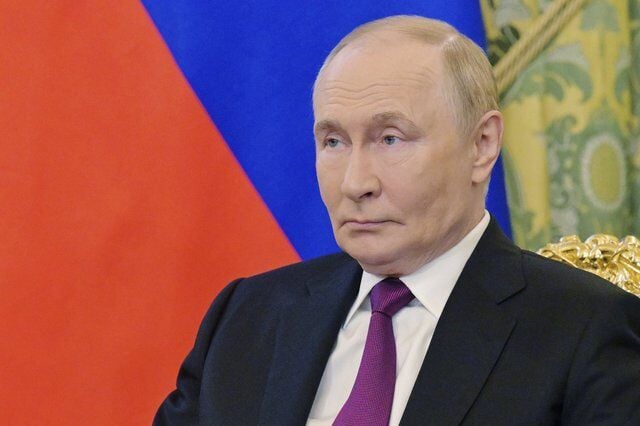OTTAWA - Prime Minister Mark Carney's government said Canada's support for Ukraine remains resolute ahead of talks Friday between U.S. President Donald Trump and Russian President Vladimir Putin.
Trump arranged the talks in Anchorage, Alaska, to discuss a possible land swap between territories held by Ukraine and those claimed by Russia. Kyiv is not taking part in the talks.
The talks started Friday afternoon and neither leader answered media questions as they sat down together. Officials later prepared podiums with Russian and American flags for a joint press conference.
"I won’t be happy if I walk away without some form of a ceasefire," Trump told Fox News on Friday, prior to the meeting.
Trump said Thursday there was a 25 per cent chance that today's summit would fail, but he also floated the idea that, if the meeting succeeds, he could bring Ukrainian President Volodymyr Zelenskyy to Alaska for a subsequent, three-way meeting.
Trump warned Wednesday of "very severe consequences" for Russia if Putin doesn’t agree to stop his invasion of Ukraine after today's meeting. He said Thursday he might be willing to stay in Alaska beyond Friday, depending on what happens with Putin.
Kremlin spokesperson Dmitry Peskov tamped down expectations of any breakthroughs at the Friday summit, saying there were no plans to sign documents and that it would be a "big mistake" to predict the results of the negotiations, according to Russian news outlet Interfax.
Putin demands that Kyiv cede the regions Moscow annexed in 2022 — even though Russia doesn’t fully control them — and recognize Crimea, illegally annexed in 2014, as part of Russia.
Putin also wants Ukraine to renounce its efforts to join NATO, limit its armed forces and recognize Russian as an official language along with Ukrainian.
Zelenskyy insists any peace deal must be acceptable to his people and include robust security guarantees against future Russian aggression.
Both Zelenskyy and the Europeans have worried that the bilateral U.S.-Russia summit would leave them and their interests sidelined, and that any conclusions could favour Moscow and leave Ukraine and Europe's future security in jeopardy.
Carney took part in talks Wednesday with European leaders and spoke directly with Zelenskyy on Monday. He said Canada's partners are "united on shared principles" and insist that Ukrainians must decide their own future.
"Diplomatic efforts must be reinforced by military and economic pressure on Russia to end its unjustified war of aggression," Carney wrote Monday on social media.Â
"We welcome the leadership of the United States in working toward securing a just and lasting peace in Ukraine."
Foreign Affairs Minister Anita Anand spoke with her Ukrainian counterpart Thursday and said borders can't be changed by violence.
"We will continue to support Ukraine through diplomatic measures, military assistance and economic aid to hold Russia accountable for its illegal war," she wrote on social media, adding that Canada's support is "unwavering."
Analysts say western solidarity with Ukraine is crucial as Putin seeks to break NATO's resolve.
Eitvydas Bajarunas, a former Lithuanian ambassador to Russia, told an online panel Thursday that the best thing countries like Canada can do is show unwavering commitment — because Moscow is betting western allies will eventually splinter.
"Putin (has) understood his strength is to outsmart the West, to outmanoeuvre the West, to wait until the West starts to crumble," Bajarunas told the Center for European Policy Analysis think tank.
"One of the goals of Putin is definitely to put a wedge into American-European relations, and to use all methods, including hybrid warfare and disinformation, to manipulate public opinion."
Olga Tokariuk, a Kyiv-based fellow with that think tank, told the panel that the optimal scenario for Ukraine would be Moscow and Washington failing to come to an agreement Friday, "if there is like no pressure in Ukraine to make any territorial concessions."
Even better for Ukraine would be fresh U.S. sanctions on Russia, if Trump feels Putin is stalling, she said.
"This war is not about territories of Ukraine. Russia has vast territories of its own," she said. "This war is about that destruction of Ukraine as a sovereign and independent state, as a state aligned with the West, as a democracy."
In recent days, Putin has expanded the scope of what the talks involve, including themes like nuclear arms control and "long-term conditions of peace between our countries, and in Europe, and in the world as a whole."
Jason Israel, a former adviser with the U.S. National Security Council, said Moscow is trying to paint Russia and the U.S. as influential countries that have restored relations after years of diplomatic chill.
He told the panel that even if there is agreement Friday on a ceasefire, it remains unclear how such a deal would be implemented, since European leaders are not at the table and haven't consented to actually putting such a ceasefire into place.
Kyiv has long insisted that safeguards against future Russian attacks provided by its Western allies would be a precondition for any durable end to the fighting. Many Western governments have been hesitant to commit military personnel.
Countries in the coalition, which includes France and the U.K., have been trying for months to secure U.S. security backing, should it be required.
— With files from The Associated Press
This report by The Canadian Press was first published Aug. 15, 2025.


